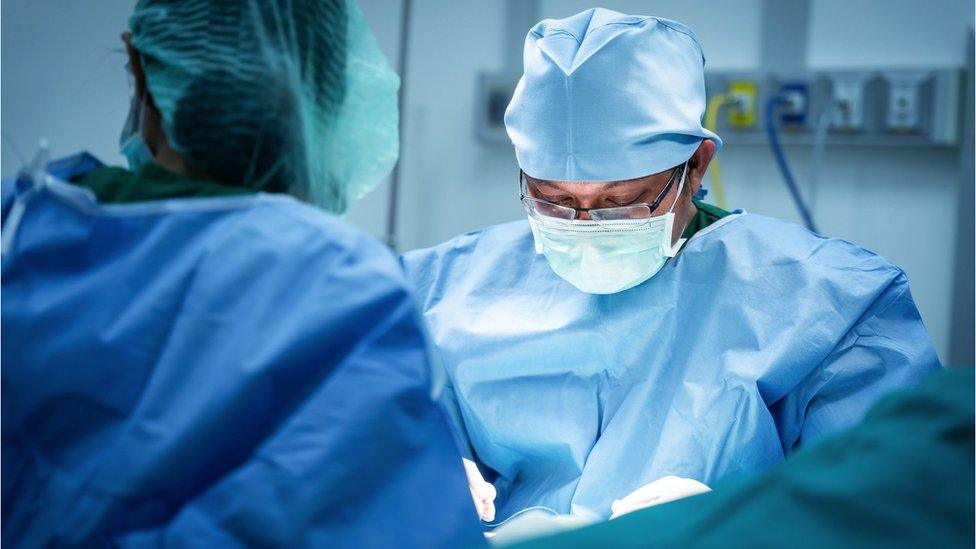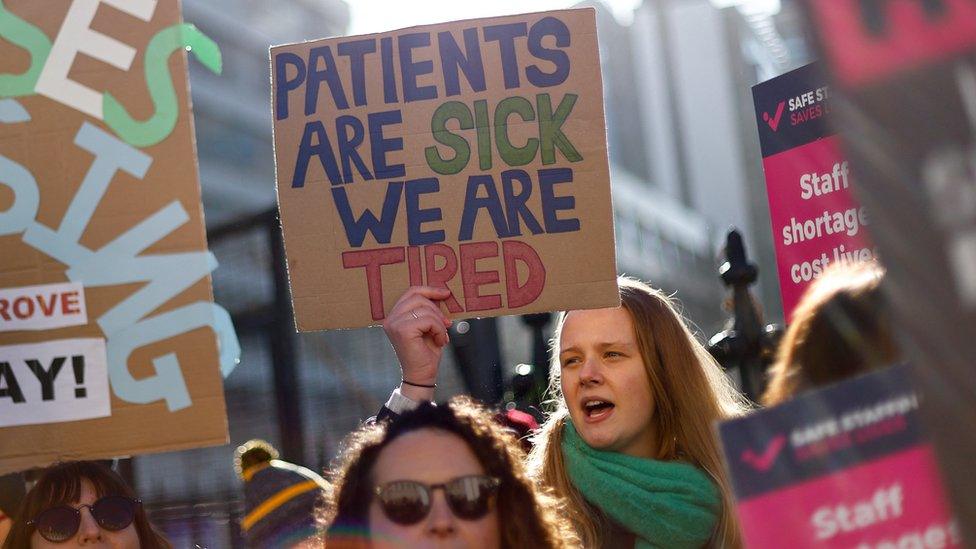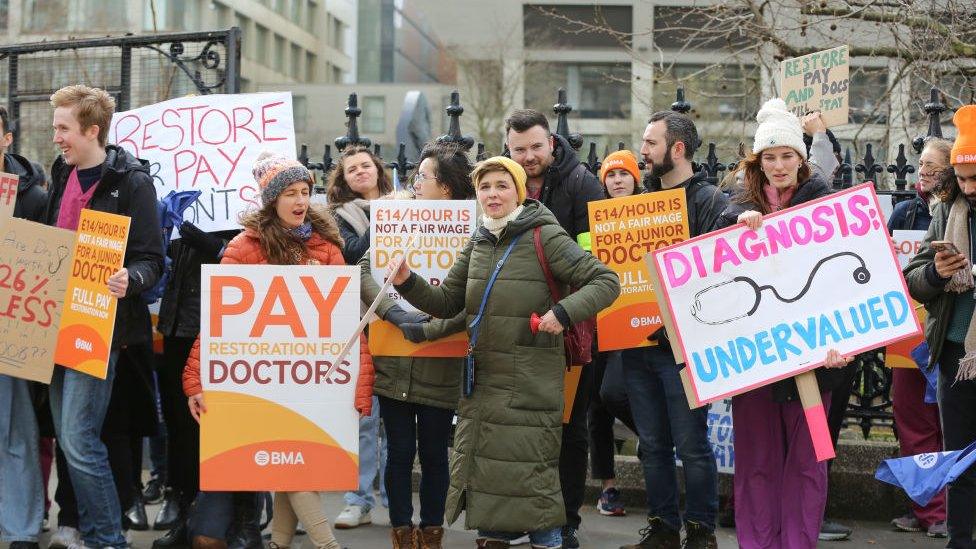Junior doctor strike led to 196,000 cancellations
- Published

More than 196,000 hospital appointments had to be cancelled because of the junior doctor strike in England last week, figures show.
It includes people who were waiting for operations and other treatments as well as scans and follow-up appointments.
The number of cancellations is the greatest so far in the NHS pay dispute.
And the true scale of the disruption is likely to be higher as many hospitals had cut back ahead of the strike to minimise last-minute postponements.
Some hospitals reported they were not carrying out up to half of their planned work so consultants could be redeployed to emergency care to cover for striking junior doctors.
The total included more than 20,000 operations and treatments. The rest were appointments, tests and check-ups.
It brings the total number of appointments affected by all the strikes over the past five months to more than 500,000 - nurses, ambulance staff and physios have been involved in industrial action as well as junior doctors.
Health Secretary Steve Barclay called the number of cancelled appointments and procedures "deeply disappointing", and blamed it for hampering efforts to cut NHS waiting lists.
He said: "We remain ready to start formal talks with the BMA as soon as the union pauses its strikes and moves significantly from its unrealistic position of demanding a 35% pay increase - which would result in some junior doctors receiving a pay rise of £20,000."
The British Medical Association said they were happy to meet the health secretary "any time, anywhere" and it was in his gift to stop the dispute.
Dr Vivek Trivedi and Dr Robert Laurenson, of the British Medical Association's junior doctors committee said: "While we are of course sorry to anyone who had their care disrupted, this is the same apology we're already having to give to patients on a daily basis because the NHS cannot cope."
NHS national medical director Prof Sir Stephen Powis said: "Today's figures lay bare the colossal impact of industrial action on planned care in the NHS.
"Each of the appointments postponed has an impact on the lives of individuals and their families and creates further pressure on services and on a tired workforce - and this is likely to be an underestimate of the impact as some areas provisionally avoided scheduling appointments for these strike days.
"Our staff now have an immense amount of work to catch up on."
'Severe impact'
It comes amid mounting concern about more industrial action across the NHS, with one hospital boss saying the planned walkout by nurses over the first May bank holiday weekend threatens the ability to staff emergency services.
On Friday the Royal College of Nursing announced a strike from 20:00 BST on 30 April to 20:00 on 2 May after its members rejected the pay offer from government.
It also said it would ballot members about taking more strike action over the course of the year.
Its mandate runs out after the bank holiday. The result of that new ballot is due mid June and unlike the last one which was organised by individual workplaces this is national ballot, which could mean nurses from across the country could walkout.
Currently, it only has a mandate for half of services in England as the other half did not reach the required threshold for the vote to count.

Nurses from the Royal College of Nursing union have rejected the government's pay offer
Unite, one of the smaller health unions which represents NHS staff such as support workers, admin staff and paramedics, also said members at London's Guy's and St Thomas' Hospital and Yorkshire Ambulance Service would walk out on 1 May.
It said the industrial action was likely to be followed by members in other services later that week.
Its ballot of members over the pay offer - a 5% increase this year along with a one-off payment of at least £1,655 - is not yet closed, but the union said it was acting as it was clear many of their members were rejecting the deal.
Unite general secretary Sharon Graham says: "All along we have said this offer is nowhere near good enough for NHS workers. The government needs to return to negotiations and put more money on the table."
Speaking to the BBC, University College London Hospitals chief executive David Probert said the spate of industrial action over recent months had left staff exhausted.
He warned the nurses' strike, which for the first time will involve staff in critical areas such as intensive care, will have a "severe impact".
He predicted planned care would "almost disappear".
And he added: "It's possible that elements of our emergency care will not be open during the strike."

Has your appointment been cancelled or delayed? Are you taking part in the strike action? Share your experiences by emailing haveyoursay@bbc.co.uk, external.
Please include a contact number if you are willing to speak to a BBC journalist. You can also get in touch in the following ways:
WhatsApp: +44 7756 165803
Tweet: @BBC_HaveYourSay, external
Please read our terms & conditions and privacy policy
If you are reading this page and can't see the form you will need to visit the mobile version of the BBC website to submit your question or comment or you can email us at HaveYourSay@bbc.co.uk, external. Please include your name, age and location with any submission.
- Published9 March 2023

- Published14 March 2023
